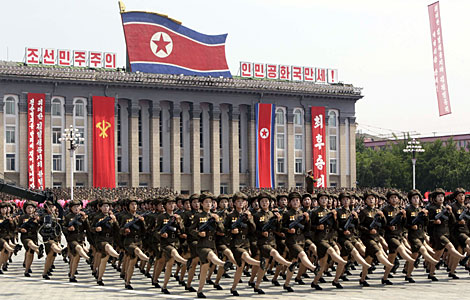Putting a duck on a perch
Updated: 2013-07-29 07:09
By He Wenping (China Daily)
|
||||||||
Driven by expediency and short-term crisis management, it is unlikely that the Israeli-Palestinian talks will achieve much
Israeli-Palestinian peace talks are the linchpin of the Middle East peace process. The long-standing Israeli-Palestinian conflict is one of the world's most intractable conflicts. Promoting negotiations between the Arab world and Israel and avoiding turbulence and conflicts in the Middle East is in line with the United States' strategic interests and has been one of Washington's diplomatic priorities.
Thanks to the importance and complexity of the peace talks, historically, whether US presidents could promote the peace process has been seen as a touchstone for their diplomatic achievements and political legacy. A photo of the leaders from Israel and the Arab world shaking hands with the US president standing in the middle beside them is regarded as proof of such an achievement.
However, apart from a historic peace treaty between Egypt and Israel brokered by former US president Jimmy Carter in 1979 (the Camp David Summit convened by former US president Bill Clinton in 2000 failed to seal a Palestinian-Israeli peace treaty on the eve of complete success), efforts by other US administrations have never managed to bear tangible fruit. Therefore, in order to "leave a legacy" in the history of US diplomacy, President Barack Obama is having a go at cracking this tough nut.
Furthermore, the resumption of the Palestinian-Israeli peace talks this time was achieved in the context of radical political changes in the Middle East and North Africa. The outbreak of the "Arab Spring" that engulfed the Arab world resulted in several political strongmen stepping down, the quick rise of Islamic forces, and a military conflict in Syria that is still raging. After the "Arab Spring", Israel's external environment worsened.
In November 2012, the United Nations General Assembly endorsed a resolution that elevated the status of the Palestinian Authority from a "non-member observer entity" to a "non-member observer state". With the annual UN General Assembly coming up in September, the US and Israel are worried that if the peace process has not made any progress by then, the Palestinian leader will call on the international community to press Israel at the UN General Assembly and resort to taking unilateral actions for a Palestine state. Therefore, no wonder an Israeli official, on condition of anonymity, said that the talks would take months to unfold and such a duration was needed "to ensure the process is substantive and comprehensive, and to get us past September".
"The best way to give these negotiations a chance is to keep them private," Kerry said. In order to create an atmosphere conducive to peace talks, Israel has agreed to release a number of Palestinian prisoners, while the Palestinians have agreed not to take unilateral actions to seek recognition for their statehood claim during the peace talks.
But it is doubtful whether the resumption of the Israeli-Palestinian peace talks, which is driven by expediency and short-term crisis management, can achieve any major breakthrough, as it is extremely difficult for the two sides to make concessions on a series of critical issues, including the expansion of Jewish settlements, border demarcation, the status of Jerusalem, Palestinian statehood and the return of prisoners. On the contrary, Netanyahu, who was kept in power earlier this year, is used to taking a hawkish stance on the Palestinian-Israeli talks.
Late last year, Israel launched a widespread campaign, called Pillar of Defense, against targets in Gaza. And after the UN General Assembly voted to grant Palestine non-member observer state status, Israel commenced a large-scale expansion of the construction of Jewish settlements in the West Bank and East Jerusalem despite strong opposition from the international community.
Meanwhile, Hamas, which controls the Gaza Strip has rejected a return to the Israeli-Palestinian peace talks. "Hamas rejects Kerry's announcement of a return to talks and considers the Palestinian Authority's return to negotiations with the occupation to be at odds with the national consensus," Hamas spokesman Sami Abu Zuhri said, adding that West Bank-based Abbas had no legitimate right to negotiate on behalf of the Palestinian people.
Therefore, promoting the peace talks is like putting a duck on a perch, that is to say it will meet with enormous resistance from the beginning. To solve the Palestinian-Israeli issue, the relevant parties must observe the UN resolutions and the principle of "land for peace".
To achieve this, it is necessary to reiterate the four-point proposal made by Chinese President Xi Jinping for the settlement of the Palestinian question during his talks with the visiting Abbas in May. The four-point proposal is as follows: the right direction to follow should be an independent Palestinian State and peaceful co-existence of Palestine and Israel; negotiation should be taken as the only way to peace between Palestine and Israel; principles such as "land for peace" should be firmly upheld; and the international community should provide an important guarantee for progress in the peace process.
Currently, with no breakthrough on the principle, the outlook for the renewed peace talks will not be optimistic.
The author is a senior fellow with the Chahar Institute and a researcher with the Institute of West Asian and African Studies at the Chinese Academy of Social Sciences.
(China Daily USA 07/29/2013 page11)
Most Viewed
Editor's Picks

|

|

|

|

|

|
Today's Top News
Experts advise CEOs on how to make it in the US
Israeli-Palestinian peace talks to resume
Latest US-China talks should smooth the way
Audit targets local government debt
30 people killed in Italy coach accident
Brain drain may be world's worst
Industry cuts cloth to measure up to buyers' needs
Reckless projects undermine the prosperity hopes
US Weekly

|

|















